Biggest Cover-up in Singapore ? ?
Jurong Island Theft: 100kg of Jet fuel additive STOLEN !
I was shocked to see this piece of news in The New Paper (29th December 2006). It is reported that thieves had made off with 100kg of Stadis 450, a jet fuel additive. Stadis 450 is classified as a flammable liquid and hazardous material.
The New paper understands that the jet fuel additive was left in six sealed pails which later went missing. I was even more surprised to read that the jet fuel additive has been missing ever since 4th December 2006. The police was subsquently informed of the theft two days later, on the 6th.
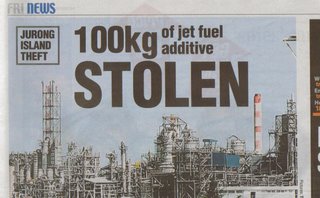
According to the Phillipine Daily Inquirer, the incident was serious enough for Singapore authorities to alert a bomb data centre in the Philippines.
Mr Joe Moreira, a security and explosive consultant, doubts that the fuel additive will be a threat. He said, “Jet fuel furns quickly in the air and you can’t sustain it for long. You need diesel to sustain the fire. So, you’ll be wasting jet fuel on a bomb.”
According to the Philippine Inquirer, "The Singapore police have alerted their counterparts in the Philippines about the disappearance of six pails of jet fuel weighing about 100 kilograms from an oil storage facility in the city-state, which they said could be used as a component for explosives, an alert bulletin obtained by the Inquirer said.
The bulletin came as Metro Manila police were recently placed on full alert in the run-up to the sixth anniversary of the Rizal Day bombings. "
I believed there remains of questions left unanswered that the Singapore authorities need to address. I strongly believed that Singaporeans need to know what exactly happened, what the authorities is doing to track down the stolen fuel, what it intends to do to prevent such similar incidents from happening again.
Personally, I would like to put forward the above few questions.
1. Why wasn’t Singaporeans informed of the theft until exactly more than three weeks later?
Why was it that the Singapore media only got to know about the theft through a foreign source?
On top of that, why wasn’t there any statement made by the Ministry of Home Affairs at the point of the theft?
2. How did the entire theft happen in spite of the tight security on Jurong Island? How can someone go in past all the access controls, and come out with stolen goods? (Since the September 11, 2001 terrorist attacks, security on Jurong Island has been stepped up and it has also been gazetted a Protected Area. Armed soldiers and police officers are involved in its security. In November 2003, the chemical hub opened a new security checkpoint featuring X-ray scanners to detect explosives and weapons, as well as three-tier vehicle barriers to bar intrusions. On top of all that, visitors must exchange their identity cards for a pass and all incoming vehicles are searched before being allowed entry).
3. If it is proven that there is a lapse in security on Jurong island, who is going to be held accountable?
4. More significantly, if the100kg of jet fuel is made into a bomb with diesel and is made to be detonated during the year-end countdown parties at Marina Bay, Vivo City, Siloso Beach, Expo, National Museum, Who is going to take responsibility for the enormous death toll and subsquently, economic and social damages.
I’m not trying to make a fuss here. I’m just concerned about the authorities’ attempt to hide information from the people. The authorities should alert the people once any breach of security or terror threat is discovered. At least, Singaporeans would not take their peace for granted. Despite all these, why is there still a media blackout on this theft, insignificant it may seem. So does this mean that in future, the authorities would only inform the people once a bomb had went off, or people are killed? I guess it’s a national security issue, thus it should remain secret. Is that the logic of the authorities?
I need answers from the top authorities now and when the investigations are done.
This is my country, my home. I do not want anything to happen to it and I placed my confidence in the security apparatus to ensure that such incidents do not happen again. However, in future, I would like to see a transparent and open attitude towards such breach of security issues. I believed that Singaporeans has the right to know about this. It’s an issue of national interest and by informing Singaporeans, each and every citizen can play its small part in helping to locate the stolen fuels if it is found lying around in our malls, transport systems and even our own neighbourhood.
Right now, many Singaporeans are still unaware of the theft, not to mention how Stadis 450 look like.
Stadis 450 ? What is that ?
A "Homing" Instinct requires a fundamental shift in mentality
Are we seeing a dawn of new street names like Kuan Yew Road, Keng Swee Street or Chin Chye Avenue? Personally, I was quite surprised that Genting Highlands won the bid for the Sentosa IR. The Singapore Government had the perfect opportunity to name an entire resort after our First Prime Minister, Lee Kuan Yew. Remember the bid by the 8th Wonder: Harry’s Island? I guess in this case, as what SM Goh had perceived, MM Lee did not believe in glorifying his place in history.
But I can't help but disagree with SM Goh. Our leaders are not glorifying themselves. Indeed, I see it as a flawed statement made by our senior minister. Can you really believe that the SM actually said all these?
Their presence and "airtime" is everywhere. To name a few
1. Major bookstores like Kinokuniya and Borders
2. School textbooks & Case studies and even in GCE Cambridege examinations and last but not least, The Straits Times (the State Times?)
As if these are not sufficient for them. Now they want a monopoly over our streets !
How about asking the URA to consider my proposal?
Thia Khiang Street?
See Tong Terrace?
Chin Siong Ave ?
Siew Choh Drive?
Underlying this statement made by the Senior Minister, it truly reflected a lack of national identity/ a national understanding of our past, and probably a lack of a sense of belonging to the little red dot.
Mr Ngiam Tong Dow in his book “A Mandarin and the making of Public Policy – Reflections by Ngiam Tong Dow” sums up this lack of a national heartware perfectly.
“Out of sheer necessity, we concentrated on the economic imperatives in education. Efficiency rather tha effetiveness, was the name of the game. Along the way, we also lost some of our cultural roots and ethnic instincts. […]
Today, we cannot go back to the status quo ante, to what was before. It will be pointless to restore dialect programmes back into our airwaves. The gerneration of grandparents today so not speak any dialect at all, having grown up under the non-dialect regime. What can be done?
A back of the envelope solution might be to encourage our English-speaking to read Chinese history, literature, and even poetry, in English to enthuse their grandchildren about their Chinese heritage.
It is not only Chinese culture that has been affected….[E]ven in English speaking schools, technical education was preferred over subjects such as literature and history.
With the neglect of English literature, yong Singaporeans do not have enough command of English to absorb the essence of western culture. Instead, Hollywood is their western cultural diet.[…]
In education, as in any field of human endeavour, we have to face reality. Our single-minded pursuit of economic prosperity has brought us to a crossroads. In a knowledge based global economy, inputs of land, labour, and captial are necessary, but not sufficient for growth and prospertiy. We have to learn to apply knowledge creatively.”
All in all, my take is this. The Singapore Government’s relentless pursuit of Sciences and Maths, due to economic necessity has led to a neglect among our citizens, an appetite for humanities like history and literature. This is especially so in today's secondary schools where humanities subjects such as history and literature are omitted from the school curriculum.
In light of this, what can our government, agencies and even individuals do to cultivate a “homing” instinct among our citizens?
“Singapore’s founding fathers will be the stars of an exhibition to be unveiled on National Day next year.
The exhibitions will showcase the contributions of the first post-independence Cabinet, which laid the foundations for Singapore’s success.
The project is one of four slated to be unvelied next year as part of the national effort to ensure their legacies continue to be remembered and that Singapore’s past remains alive among Singaporeans today.”
The Straits Times: “Contributions of founding fathers to be showcased” (Friday December 22, 2006)
Thus, I applaud this move by the National Heritage Board, through books and exhibitions, to ensure that Singapore’s past is not forgotten by our future generations and swept aside by the forces of globalisation
However, I would like to suggest some ways that the government should consider in trying to build up a national belongingness and identity among our citizenry.
A. Ensure that humanities especially modules on Singapore’s political, social and economic history is being taught to every single citizen from the age of 7 to 18. An important point to note is this. Singapore’s history must be related to our students in a just and neutral point of view, taking into account not only the PAP’s perspective on Singapore’s political and economic history, but from every single contributor to our past. Every single student will be given bonusus or exemptions for university admissions to encourage students to excel in their comprehension of Singapore’s political, social and economic history or humanities subjects in general.
B. All forms of literature on Singapore’s political, economic and social history must be sold in all major bookstores. Today, we are seeing only limited literature on these areas, usually favourable to the ruling party. Books such as Lim Chin Siong’s Comet in the Sky, and various publications by Think Centre are not being displayed or sold in major bookstores.
C. Allow political clubs and/or associations to flourish in schools. This is to encourage the exchange of ideas and the formulation of an “homing instinct” For example in France, French students are encouraged to enter universities or colleges. Some emerge as Socialists and others as Conservatives. Yet, at the end of the day, when the chips are down, they considered themselves to be Frenchmen. This is the sort of a Singapore society that I am looking forward to: political but not totally partisan; and at the end of the day, when the crunch comes, will stand side by side, and fight for Singapore. In this case, political clubs and associations thus played an important role in the initial butressing and exchange of ideas, opinions and viewpoints.
In any case, feeling at home has nothing to do with the naming of the streets/places. We have to face that fact that even after millions of dollars are being thrown into the branding of the Merlion, one does not feel that he/she is a Singaporean just because there is a Merlion sitting at the mouth of Singapore river. Naming streets, buildings and such will have the same result - it is just a name and a detached image.
One calls Singapore home because the loved ones, family and friends live here, and whatever fate that Singapore face as a nation is faced by all who are rooted here. There's no need for any abstract speculation as to why people just dont feel rooted enough to this country. Everyone, especially the policymakers must recognised that the country of Singapore is larger than the PAP (PAP < Singapore). But even larger than the country of Singapore, limited by size and population , is the nation of Singapore, which includes a diaspora. Only when this mentality is entrenched within the body politic of Singapore will there be a way forward in cultivating a sense of belonging to the country we call home.
Frozen Government Fees
22 Dec 2006
Half Frozen Half Helpful
The article "Govt to freeze fees for one year after GST hike" (ST 1 December 2006) gave much hope for the people that costs will remain affordable. The first paragraph of the article wrote:
"ALL government fees will stay frozen and not be raised for one year when the goods and services tax (GST) goes up from 5 to 7 percent"
These hopes were changed when the article "Government spells out fees to be frozen" (ST 13 December 2006) produced non-exhaustive lists of inclusions and exclusions to the fee freeze.
The Workers' Party Youth Wing would like to express its disappointment with the government having failed to take into account the need to freeze fees for basic amenities such as transport, utilities fees and polytechnic and university fees.
With the hike in GST from 5 - 7%, Singaporeans will be hard hit by an increase in their daily costs of living. Transport(16.7%), fuel & utilities (4.5%) and health care (5.3%) account for a total of 26.5% of the basket of Consumer Price Index (CPI) goods revised in 2004. This would account for a hike in inflation rates in the near future. If any offset in GST were to occur, these mentioned areas would provide a distinct impact on Singaporeans.
At the same time, radio/TV license, registration fees for passports, birth certificates and driving license, marriage registration fees are not significantly represented in the CPI. More often than not, the latter expenses are either annual or one-time payments with only a nominal impact on the lives of most Singaporeans.
The 13 Dec ST article also wrote "Fees not set by the Government are excluded from the list as any changes are determined by market or other forces". As far as the Workers' Party Youth Wing understands, public transport fees are approved by the Public Transport Council, road taxes decided by LTA, electricity tariffs are approved by the Energy Market Authority and polytechnics are Statutory Boards of the Government. However, it appears that these items were specifically excluded from the list of fee freezes.
Interestingly enough, The Workers' Party Youth Wing would like to point out that students in polytechnic and universities are already paying higher transport fees as compared to students from primary & secondary schools, Millennia Institute, junior colleges and the Institute of Technical Education. Coupled with this is the possibility of an impending increase in polytechnic and universities fees as has been historically demonstrated. The Workers' Party Youth Wing would like to see more in the budget by way of assurance that education remains foremost in the minds of polytechnic and university students instead of worrying about where the fare for the next bus or MRT ride is going to come from.
工人党青年团想要指出一个非常有趣的现象。相比之下,就读于理工学院和大专学府的莘莘学子们所缴付的车资费和小学生,中学生,初院生, 工艺教育学院生远远大不相同。此外,这些莘莘学子们还得担忧明年消费税上涨之后,学费相对调高的可能性。因此,工人党青年团促请政府体恤他们的困境,在明年财政年度财政预案中给予工院和大学生们适当的帮助与津贴。 由此一来,工院和大学生们就能更专心学业,再也不需要为每天的车资费发愁。
The Workers' Party Youth Wing welcomes the Government's announced commitment not to add to inflation at the time of the GST increase. To really achieve this goal, items for public transport fees, water & electricity and tertiary education fees should be included in the list of fee freezes. These items would provide more tangible help to the people.
Singapore Youth Parliament
The Singapore Youth Parliament is a democratically elected youth organisation consisting of elected members aged between 14 and 25.
“The SingaporeYouth Parliament aims to be an effective, open, honest, inclusive and broad-minded voice for Singapore’s young people.”
1. To offer young people in Singapore a collective national youth voice.
2. To make a difference in society by increasing young people’s participation.
3. To promote a positive image of young people
4. To connect the processes of policy making and development with young people
5. To be an independent and youth-led organisation free from influence, where young people can give their views to policy makers without hindrance, fear or barriers.
The work of the SYP is centred around involving young people in the decision-making process, particularly in consulting with young people and campaigning for these views to be adopted by the relevant decision-makers.
Too young to vote?
1. Male Singaporeans enlist into the Singapore Armed Forces at the age of 18. If young men at the age of 18 are required to serve, represent and possibly die for their country, why is it that the constitution are so skeptical of their judgements when it comes to matters of the state, in particularly electoral reforms.
2. Young Singaporeans can start pursing a life of choice and freedom at the age of 18. For instance, they have the freedom to choose whether to smoke, to drive, to club, to committ a crime and suffer the maximum punishment and exposure for their acts. In this case, why is it that young men upon the age of 18 cannot have the choice to choose who their representatives in parliament will be.
3. Politics is all about me and you. By lowering the voting age to 18, it helps to politicise the population and better create a sense of belonging to the country. This is because, with the right to vote, it's as good as empowering young men with the choice and decision to vote for policies and individuals who can best represent their interests. This will further entrench their roots into Singapore. Now that the are entasked with this heavy responsibility, they will now participate more actively in building a better future for themselves.
While it may be argue that young people are seen as rash and irresponsible in their voting patterns, I think that if given the chance, young people are far more intelligent, far more responsible, and far more mature than we give them credit for.
While it may be true that Singapore youths lack the "political acumen", it must be noted that with much political education in school and much political participation in schools, it will only be a matter of time that they are trained in electoral discipline. This particular skill in political education wil stay with them forever. Thus, in a sense, it can again be seen as a worthwhile investment in our young.
I will like to point out that by the time I turned 18, I could recognise that I am part of a community and I have to work together as a group of people in a community, whether that community is a school, a marketplace or even a country. By 18, I really can understand my obligations to the community. I'm confident that many more young people like me are mature enough to want to exercise their vote. In this case, what's stopping us from being more actively involved is the constitution which has since 1965, only allowed Singaporeans above the age of 21 to vote.
In essence, an adult is a person who has attained the age of maturity as specified by law.That's when the law recognises that you are entitled, in law, to have control over your own body, your decisions and your actions. This is where the OB markers lies.
Who is an adult? Someone who is 18 or someone who is 21?
The future of opposition
There are about 23 registered political parties in Singapore, of which as of 2006, there are about 4 prominent political organizations in Singapore. They are namely the People’s Action Party, the Workers’ Party, the Singapore Democratic Alliance (Singapore People’s Party, National Solidarity Party, Pertubuhan Kebangsaan Melayu Singapura, Singapore Justice Party) and the Singapore Democratic Party. Essentially, these 4 political parties are the most active and recognized political associations in Singapore.
In the immediate aftermath of the 2006 GE, led by the success of the Workers’ Party, the opposition parties were back in the limelight, A similar phenomenon was also seen in the aftermath of the 1991 General elections, when the SDP won 4 seats in Parliament.
In fact, I would like to suggest that the 2006 GE was a political reawakening of sorts for much of the Singapore populace. However, this issue is not the focus of this article. With the “success” of the opposition, especially The Workers' Party, what is in store for the opposition and its sympathizers in the run up to the next elections, most possibly to be held as early as 2009?
While the Worker’s Party was gaining a lot of attention and seeing an increased number of memberships and a continued process of political renewal in its leadership ranks, the other political parties were relatively quiet and muted. The SDA was rocked by the leadership tussle in one of its alliance partners; the PKMS. The leadership of the SDP was subsequently charged in courts for various confrontations with the ruling party. However, this is not to suggest that only the WP is working hard while the rest are idling around. Certainly, it would not be fair to accuse that the SDA and the SDP is taking a backseat and waiting for the next elections. A look at the websites of the NSP and the SPP would show that the SDA is still aggressively working the ground in constituencies that it had contested in the last GE; namely Jalan Besar GRC and Tampines GRC. The same can also be said of the Workers’ Party as well.
An article in the Chinese mainstream newspaper caught my attention today.
Essentially, the writer was contemplating about the future of the SDA and the impact on the political makeup in the opposition should the SDA breaks up. Interestingly enough, there was even mention of a possible alliance between the NSP and the WP.
"团结党和工人党这几年关系融洽,党要之间彼此都很熟络。据党内人士观察,以两党的交情,如果团结党因同民联的发展理念不同而出走,最有可能及最务实的做法是同工人党结成联盟,以在四五年后举行的大选中形成选战的重心。
团结党目前除了定期在星期天走访选区之外,接下来也会大力招募新党员,并且计划在明年一月把现有的党总部搬迁到惹兰勿刹,同工人党的赛阿威路总部距离不到一公里。"
In fact, with the PKMS going to court over its leadership battle, the SDA was unable to carry out its new election of its CEC, slated to be held later this year. It must be noted that the WP renew its senior leadership ranks just 2 months after the euphoria of the general elections. Again, I am not questioning the commitment and determination of the SDA in its renewal process.
From my perspective, I would firstly like to express my disappointment at this unfortunate episode in the senior ranks in the PKMS. But I harbour hopes that this will only be a minor hiccup in the renewal process within the SDA. My stand is this. The political renewal of any opposition party is a major and inevitable phenomenon in Singapore politics as the baton is gradually being passed from pre-65s to the post 65ers
Right now, I would like to urge Mr Chiam See Tong to relinquish his position as secretary general in the SDA executive committee and to allow the younger leaders in the SDA to take over. This is not a sign of disrespect and any indication of his loss of support within the party. This move is necessary as it is of utmost importance that young and capable leaders in the party gained maximum exposure to the grassroots and public before the next elections come by.
I would like to warn that if Mr Chiam holds on to power in the SDA, there could be major repercussions to future of the opposition in Singapore. Foremost, the SDA might break up and members would become disillusioned and join other political parties, thus sideling and weakening the position of Mr Chiam in his possible re-election bid in the next election. On top of that, any move to prevent political renewal would mean a step backward for opposition politics in general, dismantling the efforts and headways that the opposition had made in the last elections. It must be noted that when up against a powerful and resourceful opponent in the PAP, nothing should be spared to put up a strong, credible opposition in sync with the aspirations of the Singapore populace which is increasingly younger and more vibrant.
Be it the PAP, WP, SDA or even the SDP, the crucial thing is this. Every party that is interested in making a change in Singapore must continue to stay relevant to the electorate and continuously seek to improve, innovate and incorporate new ideas and platforms into the party. The Singapore electorate is particularly a pragmatic, choosy and fickle-minded lot. Serving the interests of all Singaporeans must be the objective of any political party in Singapore and the SDA must not have this liberty to hijack the renewal and eventual politicization of Singapore politics, which is finally at its crossroads after 41 years of PAP’s rule and structure.
Days of Being Wild
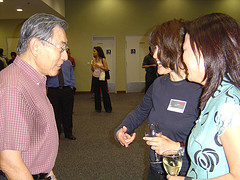
Latest Update: 11th December 2006 21 52 hrs
Days of being Wild is now available in all major bookstores ! ! !
Days of being Wild Press Release (PDF format)
Last Thursday, I attended a book launch organised by ethos books. The book is entitled "Days of being Wild", a publication depicting the 2006 GE from the opposition perspective. Here are some of the pics, courtesy of TheOnlineCitizen

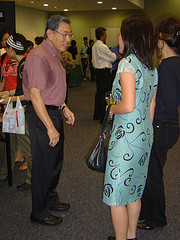
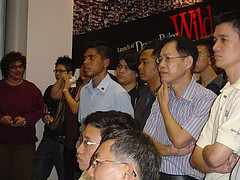
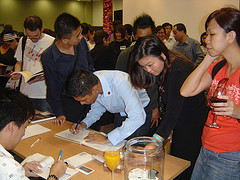
A Poem by Ong Ah Bee
Recently, my white MP,
Kok on my door, and very keh ki
Say "I've worked so hard, so vote for me,
Or rubbish won't be cleared in your vicinity"
I said "Dear MP of my GRC,
Dun remember u, so please pardon me.
I only saw you on TV,
Dozing off and jiak liao bee . . .
Last GE I voted for thee,
2% up in GST.
Cut CPF and up utility,
Are still very clear in my memory.
5 years later, then you come to me,
Fresh from your slumber of ivory.
Say that only you can help me
Escape from a life of poverty.
Just take a drive on CTE,
Count the number of all the gantries
Or squeeze a ride on the MRT,
That has not been cleared for ye . . .
My life since the last GE,
Has been doubtful though I voted P@P.
If I vote the same for your spending spree
I can expect the same misery.
So this time round, I vote for somebody
Who will kachiao you to productivity . . .
Forms fill wrong, no big deal to me,
If there's someone to speak up for Ah Bee . . .
So dear MP of GRC,
If life no improve, vote you cho simi . . .
This following poem can be found in "Days of Being Wild"
More infomation on the book launch
Straits Times' reporting on this event
"New" Progress package
Similarly, the Singapore Tourism Board announces details for the development of the Southern Islands and is seeking request-for-concepts as early as next March.
The Southern islands – Kusu, St John’s. the Sisters’ Islands, Kias, Lazarus and Seringar – draw at least 100,000 visitors a year and have been said to have the potential to be similar to Italy’s Isle of Capri, a marine village, or Dubai’s The Palm island, a development for the ultra wealthy.
On top of this next mega-tourism project, Sentosa looks set to have a new resort hotel with a beach front as well.
While there have been arguments along the line of environment and heritage, I would like to look at this issue from a totally different angle.
It is said that when there’s a demand, there will be a supply. And in this case, there is an increasing demand for products servicing the rich and famous in Singapore. As of 2004, there were 202,500 individuals with liquid wealth of more than US$200,000 each. This figure is expected to increase to 272,800 individuals by 2009, growing annually by 6.4%.
According to the latest World Wealth Report by Cap Gemini and Merrill Lynch, the number of millionaires in Singapore - defined as having liquid assets of US$1 million - grew by 22.4% over the past year to hit some 55,000. The Inland Revenue Authority of Singapore puts the number of people here earning over $1 million in taxable income at 1,724 – a 15% increase compared to the previous financial year
In fact, high-end properties such as The Sail@Marina Bay, Sentosa Cove and St Regis Residences – which don’t go for any less than $1,000 per sq ft – aren’t the only objects of desire to sell out like hot cakes.
Luxury cars like Lamborghini and Ferraris have seen brisk sales with 21 units and 32 units sold respectively this year.
Furthermore, fine dining clubs like The China Club has seen membership revenue increase by 85% over the past year, with average therespending per client up by 30%.
My point is this. Singapore has seen remarkable economic progress and this has allowed many Singaporeans to alleviate itself away from the poverty cycle in a span of a generation. While there are a lot of rich people here, there are also some poor people around us, and I am particularly worried about this burgeoning income gap between the rich and the poor.
"We will be starting on a wrong footing if we proceed on the premise that thus far nothing has been done to help our low-income, the poor and the elderly. In fact, through the Progress Package, ComCare Fund, workfare bonus and other initiatives, the Government has spent billions of dollars to help needy Singaporeans. With the many-helping-hands approach, the labour movement too has done its part to help our low-income workers. This year alone, NTUC distributed $6.4 million in the form of hardship grants, transport vouchers, Fairprice vouchers, Family Recreation Fund and through the Back-to-School programme as well as through bursaries and scholarships."
Mdm Halimah Yacob, MP for Hong Kah GRC, speaking in Parliament, 8th November 2006.
I fully support the fact that the government has been reluctant to institutionalise a welfare system into our social politic. However, there must be an institutional way to help our poor. At the moment, we are only seeing consistent and repetitive one-time handouts especially during times of economic growth. This has also resulted in Singaporeans being used to receiving yearly monetary rewards.
I believed that this will reduce the resilience of Singaporeans when the country faces a crisis. We are told that as long as we swallow the bitter pills and take the plunge to boldly cuts our cost and restructure our economy, we will be fine. There will be light at the end of tunnel. What happened if our economy plunges into a recession? It doesn’t matter as Singaporeans are already so used to receiving their share of the nation wealth year-in-year-out. When that comes, the government rationale of economic restructuring might not be that appealing to Singaporeans anymore.
In that case, there is a need to institutionalise our “progress package” for our lower-income families. Here is what I recommend:
We should set up a totally new government ministry with its own budget to directly tackle the needs of our poor. A cabinet minister should be appointed so that the poor will have its needs directly addressed to the Prime Minister. In this way, this will reduce the impression that the poor and disadvantaged are being marginalised.
This ministry for the poor and disadvantaged will set and oversee policies (to be revised)like
a. GST for basic necessities will be set at 3% - four percentage points lower than the approved tax rate. The implementation and enforcement of such a tax policy will be overseen by this particular ministry.
b. A better definition of the lower income and the middle income. More often than not, the people found at the lower spectrum of the middle income category suffered more from the increase in the cost of living.
c. Education costs must be addressed. School fees should be waiver until the college level. Subsidies should be given to ensure that each child’s expenses on education, from school books to stationary are being well taken care of.
d. GST on health cost expenses should be waiver.
While these recommendations required that huge amount of government expenditure are required, but the government should see it as a moral crusade and take this heavy burden upon its shoulders. In the first place, these people gave them the mandate and confidence so that their needs will be addressed. From their perspective, the PAP government is the best people to help. In this case, its more than a moral crusade, the government need to ensure that the poor are not left behind by society.
In the words of Mr Low Thia Khiang, secretary general of the Workers’ Party and MP for Hougang SMC at the recent parliamentary sitting:
“I feel that the transition into a globalised economy and the Government’s determination to maintain its principle of a low tax regime, the uneven distribution of wealth and the widening income gap will become an insurmountable social problem in future. The Government should help the low-income people as soon as possible to correct the mechanism that causes the anomaly in the distribution of the fruits of our economic development, and incorporate the appropriate measures into our social safety net structure.”
There’s no time to lose. It’s now or never.